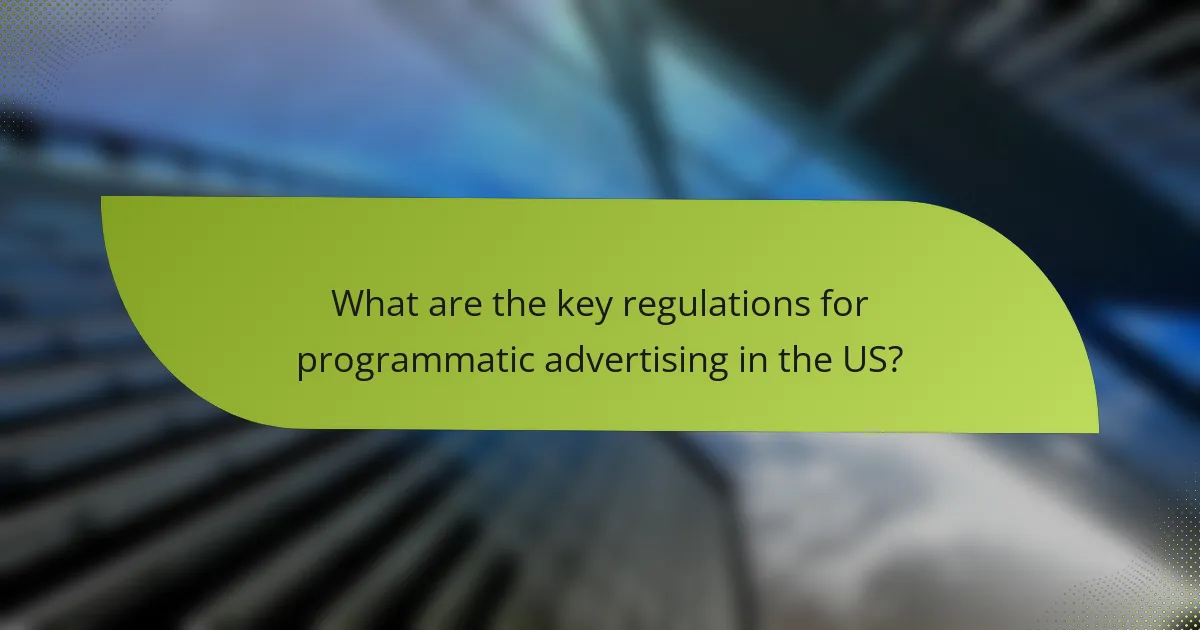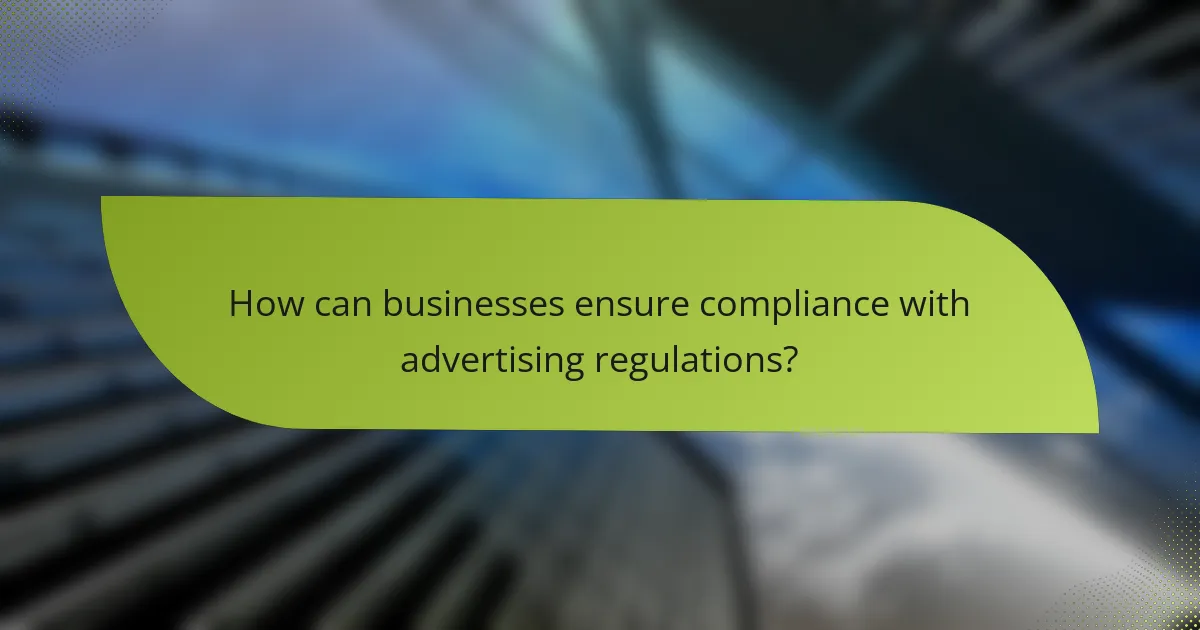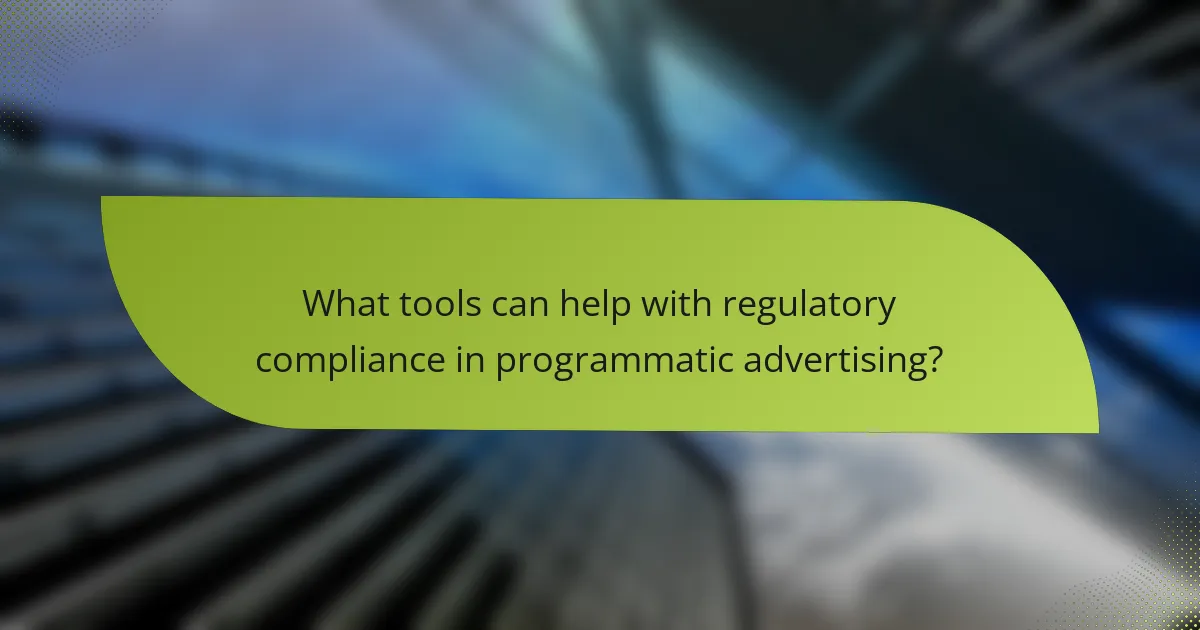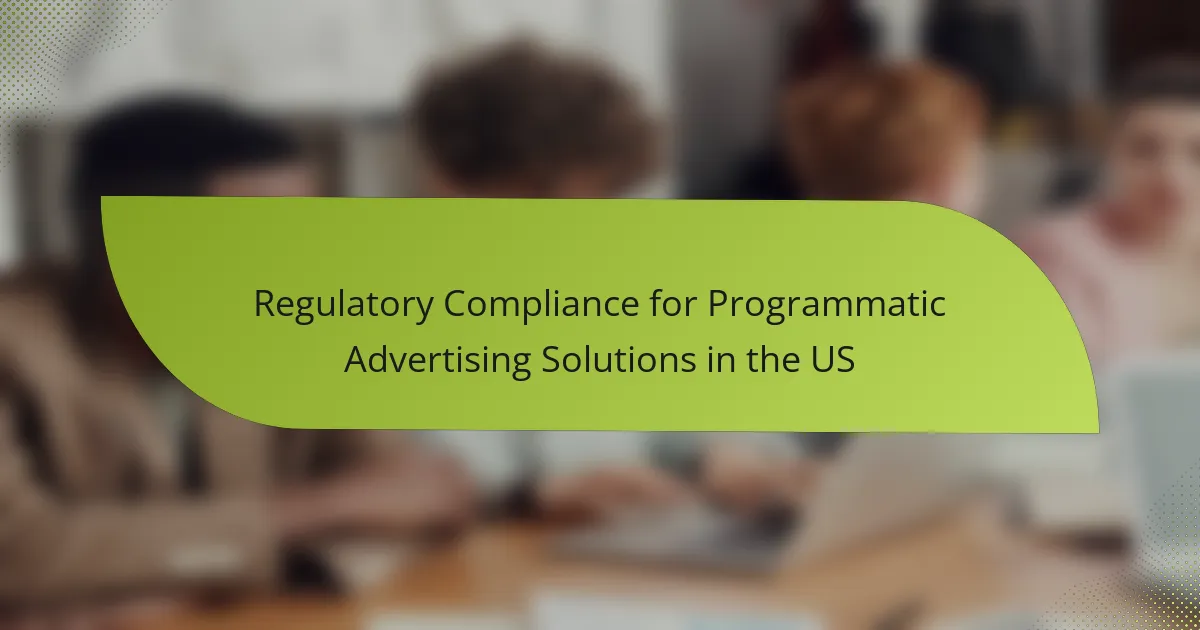Regulatory compliance in programmatic advertising is crucial for safeguarding consumer privacy and adhering to laws such as the CCPA, GDPR, and COPPA. Companies must implement strong data privacy policies and conduct regular audits to mitigate risks and maintain consumer trust. Failure to comply can result in severe penalties, reputational damage, and legal actions, ultimately affecting a company’s market position.

What are the key regulations for programmatic advertising in the US?
The key regulations for programmatic advertising in the US focus on consumer privacy and data protection. Compliance with laws like the CCPA, GDPR, and COPPA is essential for companies operating in this space to avoid penalties and maintain consumer trust.
California Consumer Privacy Act (CCPA)
The CCPA grants California residents specific rights regarding their personal information, including the right to know what data is collected and the right to opt-out of its sale. Businesses must provide clear notices and allow consumers to access and delete their data.
To comply with the CCPA, companies should implement transparent data practices, update privacy policies, and establish mechanisms for consumers to exercise their rights. Non-compliance can lead to fines that range from thousands to millions of dollars, depending on the severity of the violation.
General Data Protection Regulation (GDPR) compliance
While the GDPR is a European regulation, it impacts US companies that handle data of EU residents. It requires explicit consent for data collection and processing, along with the right for individuals to access and delete their information.
To ensure GDPR compliance, US businesses should conduct regular data audits, implement robust consent management systems, and provide clear privacy notices. Failure to comply can result in hefty fines, potentially reaching up to 4% of annual global revenue.
Children’s Online Privacy Protection Act (COPPA)
COPPA protects the privacy of children under 13 by requiring parental consent before collecting personal information from them. This regulation applies to websites and online services directed at children, including many programmatic advertising platforms.
To comply with COPPA, companies must clearly disclose their data collection practices, obtain verifiable parental consent, and provide parents with the ability to review and delete their child’s information. Non-compliance can lead to significant penalties, including fines and restrictions on data practices.

How can businesses ensure compliance with advertising regulations?
Businesses can ensure compliance with advertising regulations by implementing robust data privacy policies, conducting regular compliance audits, and training staff on legal requirements. These steps help mitigate risks associated with programmatic advertising and align practices with federal and state laws.
Implementing data privacy policies
Data privacy policies are essential for compliance as they dictate how businesses collect, store, and use consumer data. Companies should establish clear guidelines that adhere to regulations such as the California Consumer Privacy Act (CCPA) and the General Data Protection Regulation (GDPR) for those operating internationally.
Key components of a data privacy policy include transparency about data usage, obtaining user consent, and providing options for data access and deletion. Regularly updating these policies to reflect changes in regulations or business practices is crucial.
Regular compliance audits
Conducting regular compliance audits helps businesses identify gaps in their advertising practices and ensure adherence to relevant regulations. These audits should review data handling processes, advertising content, and vendor compliance to mitigate potential legal issues.
Audits can be performed quarterly or biannually, depending on the size of the organization and the complexity of its advertising operations. Utilizing third-party auditors can provide an objective assessment and improve accountability.
Training staff on legal requirements
Training staff on legal requirements is vital for maintaining compliance in programmatic advertising. Employees should be informed about relevant laws, such as the CCPA and the Federal Trade Commission (FTC) guidelines, to understand their responsibilities in data handling and advertising practices.
Regular training sessions, workshops, and updates on regulatory changes can help reinforce compliance culture within the organization. Consider creating a checklist of key legal concepts for staff to reference, ensuring they remain informed and vigilant in their roles.

What are the consequences of non-compliance in programmatic advertising?
Non-compliance in programmatic advertising can lead to significant repercussions, including financial penalties, damage to brand reputation, and potential legal actions from consumers. These consequences can severely impact a company’s operations and market position.
Fines and penalties
Companies that fail to adhere to regulatory standards in programmatic advertising may face substantial fines and penalties. These financial repercussions can range from thousands to millions of dollars, depending on the severity of the violation and the regulatory body involved.
For instance, violations of the Federal Trade Commission (FTC) regulations or the General Data Protection Regulation (GDPR) can result in hefty fines. Organizations should regularly audit their compliance practices to avoid these costly outcomes.
Reputation damage
Non-compliance can lead to significant reputation damage, which may take years to rebuild. Consumers are increasingly aware of privacy issues and may choose to avoid brands that do not prioritize compliance and ethical advertising practices.
Negative publicity from compliance failures can deter potential customers and partners, leading to a decline in sales and market share. Maintaining transparent and compliant advertising practices is essential for sustaining consumer trust.
Legal action from consumers
Consumers have the right to take legal action against companies that violate advertising regulations, particularly regarding data privacy and consent. This can result in class-action lawsuits, which can be costly and damaging to a brand’s reputation.
To mitigate this risk, businesses should ensure they have robust compliance measures in place, including clear privacy policies and consent mechanisms. Proactively addressing compliance can help prevent legal disputes and foster consumer confidence.

What tools can help with regulatory compliance in programmatic advertising?
Several tools can assist with regulatory compliance in programmatic advertising by streamlining processes, ensuring data privacy, and keeping businesses updated on regulatory changes. Utilizing these tools can help organizations navigate complex regulations while maintaining effective advertising strategies.
OneTrust for data privacy management
OneTrust is a leading platform for data privacy management that helps organizations comply with various regulations such as GDPR and CCPA. It offers features like data mapping, consent management, and privacy impact assessments, which are essential for maintaining compliance in programmatic advertising.
By implementing OneTrust, companies can automate data subject requests and manage user consent more effectively, reducing the risk of non-compliance. Regular audits and reporting capabilities also help ensure that data practices align with current regulations.
TrustArc for compliance automation
TrustArc provides compliance automation solutions that simplify the management of privacy regulations. Its platform includes tools for risk assessments, compliance reporting, and vendor management, which are crucial for programmatic advertising operations.
Using TrustArc, businesses can streamline their compliance processes, ensuring that they meet regulatory requirements efficiently. The platform also offers customizable dashboards that provide insights into compliance status, helping organizations stay proactive in their regulatory efforts.
Compliance.ai for regulatory updates
Compliance.ai is a tool designed to keep businesses informed about regulatory changes that impact their operations. It aggregates and analyzes regulatory content, providing timely updates relevant to programmatic advertising and data privacy.
By leveraging Compliance.ai, organizations can stay ahead of regulatory changes, ensuring that their advertising practices remain compliant. The platform’s ability to filter regulations based on specific business needs allows for targeted compliance efforts, reducing the risk of oversight.

What are the best practices for maintaining compliance in programmatic advertising?
Maintaining compliance in programmatic advertising involves adhering to legal standards and industry guidelines to protect user data and privacy. Key practices include implementing robust security measures, ensuring transparent user consent, and regularly updating compliance strategies to reflect evolving regulations.
Data encryption and security measures
Data encryption is essential for protecting sensitive information during transmission and storage. Implementing end-to-end encryption can help safeguard user data from unauthorized access, which is critical in maintaining compliance with regulations such as the GDPR and CCPA.
Additionally, employing security measures like firewalls, intrusion detection systems, and regular security audits can further enhance data protection. Organizations should also consider using secure servers and cloud services that comply with industry standards.
Transparent user consent mechanisms
Transparent user consent mechanisms are vital for ensuring that users understand how their data will be used. This can be achieved by providing clear, concise privacy policies and consent forms that outline data collection practices.
Utilizing opt-in and opt-out options allows users to have control over their data. Regularly reviewing and updating these consent mechanisms in line with legal requirements can help maintain compliance and build trust with users.
Regular updates to compliance strategies
Regular updates to compliance strategies are necessary to adapt to changes in regulations and industry standards. Organizations should conduct periodic reviews of their compliance practices to identify gaps and implement necessary changes.
Staying informed about new laws and guidelines, such as the California Privacy Rights Act (CPRA) or updates to the Federal Trade Commission (FTC) regulations, is crucial. Engaging with legal experts or compliance consultants can provide valuable insights and help ensure that strategies remain effective and compliant.



